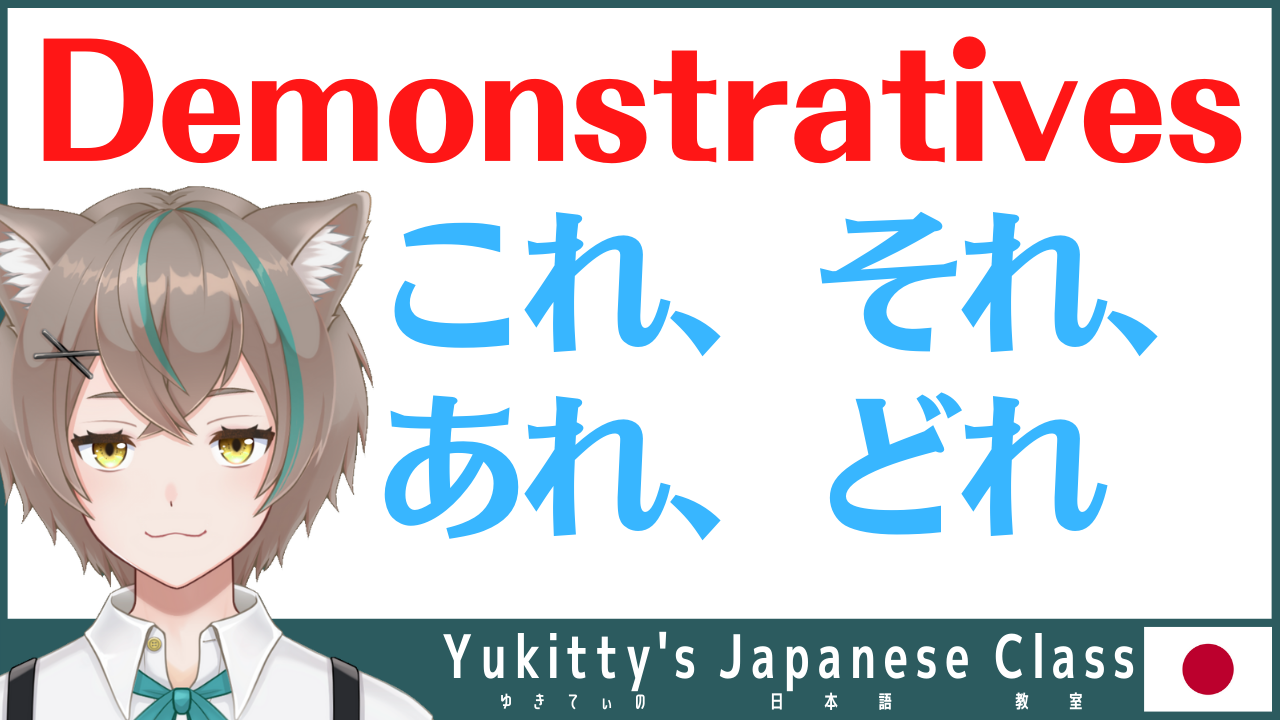


これ / それ / あれ / どれ
Demonstratives represent things, places, directions, etc.
They are used to depend on whether what you want to indicate is near the speaker, near the listener, or far from both.
They have pronoun usages, adnominal adjective usages, and adverbial usages.

| Usage | Distance | Near speaker | Near listener | Far from both | Question |
|---|---|---|---|---|
| Thing | これ this | それ it | あれ that | どれ which |
| Place | ここ here | そこ there | あそこ over there | どこ where |
| Direction (polite) Person (polite) Thing (polite) | こちら this place this person this thing | そちら your place you the thing | あちら that place that person that thing | どちら where who which |
| Direction | こっち this side this direction | そっち your side this direction | あっち that side that direction | どっち which |
| Person (casual) Thing (casual) | こいつ this guy this | そいつ the guy it | あいつ that guy that | どいつ who which |
What is it?
In this case “it” indicates the thing near the listener
The station is in this direction.
In this case “this direction” indicates the direction near the speaker side
駅 [noun] station
That guy is genius.
In this case “that guy” indicates the person who is far from speaker and listener
天才 [noun] genius
Which would you like?
なさる+ます+か [verb+auxiliary verb+particle] do you? would you like?
| Usage | Distance | Near speaker | Near listener | Far from both | Question |
|---|---|---|---|---|
| Indication | この this (+thing) | その that (+thing) | あの that (+thing) | どの which (+thing) |
| State (like Na-adjective) | こんな like this | そんな like that(you said) | あんな like that | どんな what kind |
I’ll buy this pen.
In this case, the speaker is closer to the pen than anyone else.
ペン [noun] pen
買う [verb] buy
It is like that.
In this case, it feels like the speaker agreed with the listener’s opinion.
感じ [noun] feeling, impression
I’ve heard that story.
In this case, “that story” refers to the story that the listener told just before.
話 [noun] story, tale, topic, talk, speech
こと+が+ある+ます [noun+perticle+verb+auxilirary verb] I have V(p.p.)
Who is that person?
In this case, “that person” is far from speaker and listener.
人 [noun] person
What kind of music do you like?
音楽 [noun] music
好き [Na-adjective] like, preferred, favorite
| Usage | Distance | Near speaker | Near listener | Far from both | Question |
|---|---|---|---|---|
| State | こう like this | そう like that(you said) | ああ like that | どう what, how |
Yes, it is (like that you said).
I don’t want to be like that.
Translate the following sentences into English, paying attention to the demonstratives.
そいつは大変だ。
大変 [noun] serious, hard
そいつは大変だ。
It‘s hard.
そちらの天気はどうですか?
天気 [noun] weather
そちらの天気はどうですか?
How is the weather there?
私とあの子、どっちが好きなの?
子 [noun] child, girl, boy
私とあの子、どっちが好きなの?
Which do you like better, me or that girl?
こんなはずじゃなかった。
はず [noun] must be, supposed to be
ない [I-adjective] not
こんなはずじゃなかった。
It was not supposed to be like this.
こうしてサトシは勝利した。
勝利する [verb] win
こうしてサトシは勝利した。
Thus Satoshi won. / Satoshi won like this.

この記事が気に入ったら
フォローしてね!
Comment